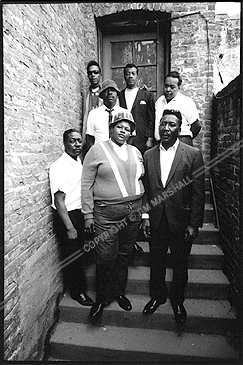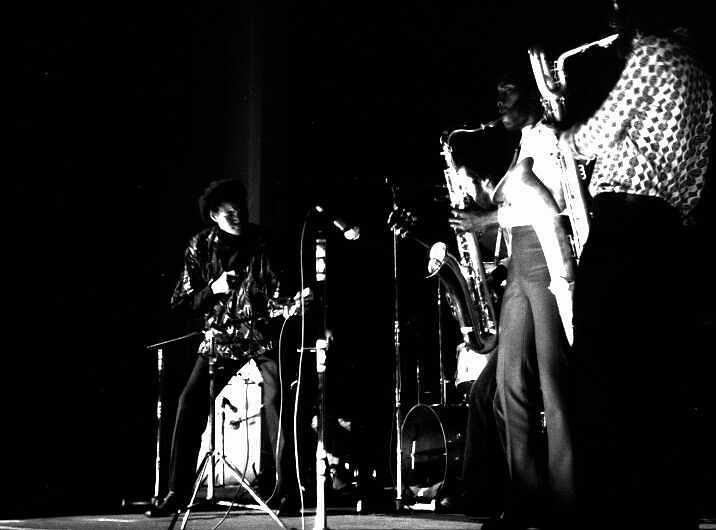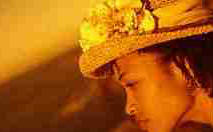




















































































 
|
|
 Big Mama Thornton
Big Mama Thornton
Photo right copyright © Charles Sawyer
December 11, 1926 - July 25, 1984
The story of Willa Mae "Big Mama" Thornton is
a painful illustration of the obstacles and ambiguities faced
historically by female artists and by artists of color. Born in
1926 in Montgomery, Alabama, Willie Mae Thornton left home in
1941 at age 14 to join the Georgia-based Hot Harlem Revue.
One of seven children. Her father
was a minister, and her mother sang in the church. The church's
early musical influence helped her win first place in an amateur
singing show. Sammy Green of Atlanta saw her there, and she went
to play with his "Hot Harlem Review." In 1948 she moved
to Houston, where she lived for a few years. She sang and wrote
songs for performances in the local clubs. Thornton only stayed
a while, but she was influenced by Texas, and she contributed
heavily to the Texas blues tradition. Willie Mae, Little Esther,
and Mel Walker were a package show for Johnny Otis in the early
1950s. They became well known and headed to New York to play the
Apollo in 1952. Willie Mae, as the opening act, sang the
Dominoe's hit "Have Mercy Baby," among others. She was a
huge success and headlined the show the next night at the
Apollo. The nickname "Big Mama" came from somebody after
the first show, and it stuck. She was a large, tall woman, and
the name fit well with her vocal tension and coarseness. In 1951
Don Robey signed Thornton to his Peacock Records label.
Her 1952 recording of Hound Dog went to number one on
the rhythm and blues charts, and later became a hit for Elvis
Presley. Despite Big Mama's frequent claims to authorship of
this song, she was unable to prove it in court. She received
$500 for her recording and never collected any subsequent
royalties from later cover versions. Big Mama continued touring
and recording for thirty years and enjoyed a brief resurgence of
popularity in the sixties when Janis Joplin recorded Thornton's
blues classic Ball 'n' Chain, but none of her later work ever
matched the success of Hound Dog. Willie Mae became an
instant star, but she didn't see much money from the songs. She
played some drums and harmonica which she learned from Junior
Parker.
 Big
Mama flew from Houston in 1953 back to New York for Peacock-Duke
records to the "Hound Dog" sessions. The B-side was
"They Call Me Big Mama," and the single sold almost two
million copies. She received one check for the single in her
life for only $500, even though Elvis Presley went on to make
"Hound Dog" a rock and roll classic three years later. In a
similar occurrence, she wrote and recorded "Ball and Chain,"
which became a hit for her. Janis Joplin, a rock and roll
singer from Texas, later recorded "Ball and Chain," and
it became a huge success in the late 1960s. Thornton left
Houston in early 1960s and moved to the San Francisco Bay area.
Big Mama toured with shows in America and Europe. She played the
Monterey Jazz Festival throughout the 1960s and 1970s. Big
Mama flew from Houston in 1953 back to New York for Peacock-Duke
records to the "Hound Dog" sessions. The B-side was
"They Call Me Big Mama," and the single sold almost two
million copies. She received one check for the single in her
life for only $500, even though Elvis Presley went on to make
"Hound Dog" a rock and roll classic three years later. In a
similar occurrence, she wrote and recorded "Ball and Chain,"
which became a hit for her. Janis Joplin, a rock and roll
singer from Texas, later recorded "Ball and Chain," and
it became a huge success in the late 1960s. Thornton left
Houston in early 1960s and moved to the San Francisco Bay area.
Big Mama toured with shows in America and Europe. She played the
Monterey Jazz Festival throughout the 1960s and 1970s.
Outspokenly bitter about what she perceived as the injustices
done to her by the music business, Big Mama cultivated her image
as a tough, outspoken eccentric, often dressing as a man
on-stage toward the end of her career. She valiantly tried to
recreate her past glory, but was often too drunk or too ill to
perform. On July 25, 1984, paramedics responding to an anonymous
call found Big Mama dead on the floor of her Los Angeles
boarding house room, penniless and alone at age 57.
Her style captured the attention
of many fans through the years because she was rough and
beautiful and crazy yet controlled in her singing. Many
companies recorded her work, such as Mr. Strachwitz's record
company, Arhoolie Records, who released Big Mama Thornton in
Europe (1966) and Big Mama Thornton with the Chicago Blues Band
(1967). On the latter, Muddy Waters, Sam (Lightnin') Hopkins,
and Otis Spawn appeared. In 1968 Ball and Chain compiled
separate blues songs by Willie Mae, Hopkins, and Larry Williams.
In the early 1970s she recorded Saved for Pentagram
Records and She's Back for Backbeat Label. Vanguard
Records caught her twice in the latter half of the decade in two
penitentiaries with Jail and again with Sassy Mama!
She appeared again in New York in 1983 at the Newport Jazz
Festival with Muddy Waters, B. B. King, and Eddie Cleanhead
Vinson. The show was captured by Buddha records on The
Blues-A Real Summit Meeting.
 In
her most recent book Blues Legacies and Black Feminism, Angela
Davis explains how the tradition of black women blues singers
represented by Ma Rainey, Bessie Smith, and Billie Holiday
"embodies not only an artistic triumph and aesthetic dominance
over a hostile popular music industry but an unacknowledged
proto-feminist consciousness within working-class black
communities." Davis uncovers "the unmistakable assertion and
uncompromising celebration of non-middle class, non-heterosexual
social, moral and sexual values." Unfortunately Davis does not
include the contributions of Big Mama Thornton in her analysis.
Big Mama is among the last, if not the last, in the great
tradition of black women blues singers. In her voice we hear
echoes of Bessie Smith and Ma Rainey. In
her most recent book Blues Legacies and Black Feminism, Angela
Davis explains how the tradition of black women blues singers
represented by Ma Rainey, Bessie Smith, and Billie Holiday
"embodies not only an artistic triumph and aesthetic dominance
over a hostile popular music industry but an unacknowledged
proto-feminist consciousness within working-class black
communities." Davis uncovers "the unmistakable assertion and
uncompromising celebration of non-middle class, non-heterosexual
social, moral and sexual values." Unfortunately Davis does not
include the contributions of Big Mama Thornton in her analysis.
Big Mama is among the last, if not the last, in the great
tradition of black women blues singers. In her voice we hear
echoes of Bessie Smith and Ma Rainey.
Her career began at the
very end of the era of great female blues singers, and by the
time she hit middle age, public interest had shifted away from
her particular style of singing. In 1998, many women artists of
color still struggle with some of the same issues that Big Mama
faced. The opportunities for large, middle-aged women artists of
color are still very limited. At some point, Big Mama gave in to
bitterness and alcoholism.
Thornton died of a heart attack
on July 25, 1984, in Los Angeles, California. Her sensitive,
down-to-earth voice was released one last time by Ace Records in
the United Kingdom on a posthumous album titled Quit Snoopin'
'round My Door. She was inducted into the Blues Foundation's
Hall of Fame in 1984. As a female in a male-dominated
profession, Big Mama Thornton made an indelible mark on the
music world with her Texas-sized voice and confident lyrics.
Thornton was inducted into the Rock and Roll Hall of Fame in
1984 after her death.
Source: http://www.busyfingers.com/fundwomen/bigmama.html

Paris 1972
|
|

|

|